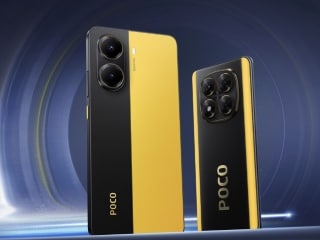- Home
- Science
- Science News
- This Face Mask Tech Uses Biosensors to Detect COVID 19 in Your Breath Within 90 Minutes
This Face Mask Tech Uses Biosensors to Detect COVID-19 in Your Breath Within 90 Minutes
Researchers said that you can activate sensors with a button and a readout strip reflect results within 90 minutes.

Photo Credit: Wyss Institute at Harvard University
The bionsensor tech can be integrated into any standard face mask
COVID-19 has turned the world upside down. While vaccination drives in several countries have gained momentum, the threat of a third wave in some countries, including India, looms large. A team of researchers at the Massachusetts Institute of Technology (MIT) and the Wyss Institute for Biologically Inspired Engineering at Harvard University have developed a wearable biosensor technology that can help face masks detect COVID-19 in your breath.
The study, "Wearable materials with embedded synthetic biology sensors for biomolecule detection," has been published in the Nature Biotechnology journal. These wearable biosensors have been installed in standard KN95 face masks to identify if the virus was present in a person's breath. And it's quick too. Researchers said that you can activate sensors with a button and the readout strip reflects results within 90 minutes. Not just that, the accuracy level is just the same as the standard PCR COVID tests, they added.
Peter Nguyen, a research scientist at the Wyss Institute and co-author of the study, said that the team essentially brought an entire diagnostic laboratory into a small, synthetic biology-based sensor that works with any face mask, adding, that it had the high accuracy of PCR tests with the speed and low cost of antigen tests. “In addition to face masks, our programmable biosensors can be integrated into other garments to provide on-the-go detection of dangerous substances, including viruses, bacteria, toxins, and chemical agents,” Nguyen said in a statement.
Nina Donghia, a staff scientist at the Wyss Institute and a co-author on the study, said that this advanced technology can also be used to equip lab coats of scientists working with hazardous materials or pathogens and even the uniforms of first responders and military personnel "who could be exposed to dangerous pathogens or toxins, such as nerve gas.”
The team is now looking for manufacturing partners who can produce these masks in large numbers so that they are made available during the pandemic, researchers said.
Get your daily dose of tech news, reviews, and insights, in under 80 characters on Gadgets 360 Turbo. Connect with fellow tech lovers on our Forum. Follow us on X, Facebook, WhatsApp, Threads and Google News for instant updates. Catch all the action on our YouTube channel.
Related Stories
- Samsung Galaxy Unpacked 2026
- iPhone 17 Pro Max
- ChatGPT
- iOS 26
- Laptop Under 50000
- Smartwatch Under 10000
- Apple Vision Pro
- Oneplus 12
- OnePlus Nord CE 3 Lite 5G
- iPhone 13
- Xiaomi 14 Pro
- Oppo Find N3
- Tecno Spark Go (2023)
- Realme V30
- Best Phones Under 25000
- Samsung Galaxy S24 Series
- Cryptocurrency
- iQoo 12
- Samsung Galaxy S24 Ultra
- Giottus
- Samsung Galaxy Z Flip 5
- Apple 'Scary Fast'
- Housefull 5
- GoPro Hero 12 Black Review
- Invincible Season 2
- JioGlass
- HD Ready TV
- Latest Mobile Phones
- Compare Phones
- Samsung Galaxy S26+
- Samsung Galaxy S26 Ultra
- Samsung Galaxy S26
- iQOO 15R
- Realme P4 Lite
- Vivo V70
- Vivo V70 Elite
- Google Pixel 10a
- Asus TUF Gaming A14 (2026)
- Asus ProArt GoPro Edition
- Infinix Xpad 30E
- Brave Ark 2-in-1
- AI+ Wearbuds
- AI+ NovaWatch Kids 4G
- Xiaomi QLED TV X Pro 75
- Haier H5E Series
- Asus ROG Ally
- Nintendo Switch Lite
- Haier 1.6 Ton 5 Star Inverter Split AC (HSU19G-MZAID5BN-INV)
- Haier 1.6 Ton 5 Star Inverter Split AC (HSU19G-MZAIM5BN-INV)

















